IOS Latest Publication "Gandhi: Siyasat aur Sampradayikta [Gandhi: Politics and Communalism] Released
IOS Latest Publication "Gandhi: Siyasat aur Sampradayikta [Gandhi: Politics and Communalism] Released
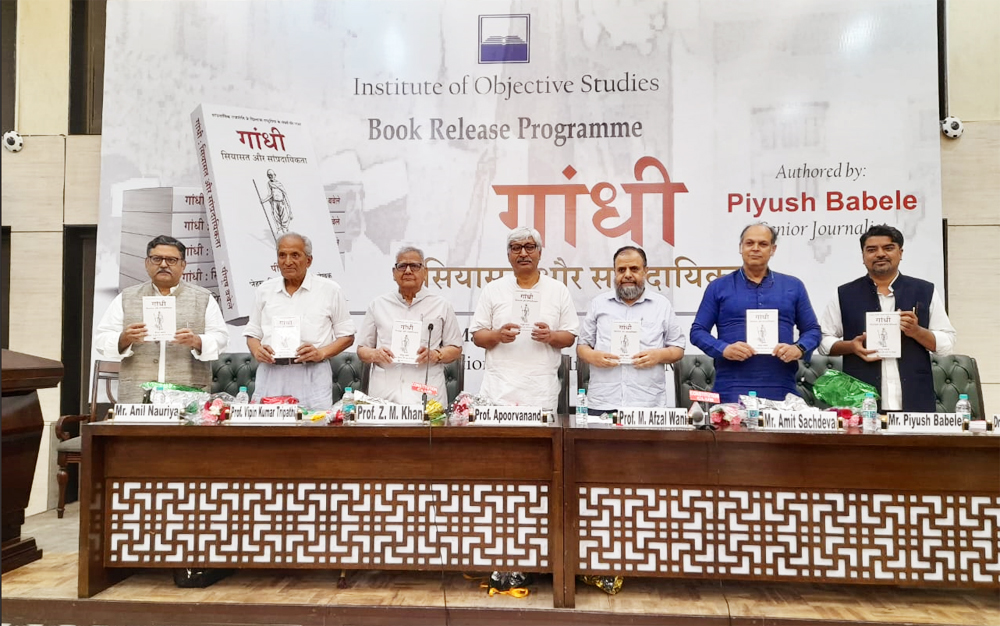
New Delhi: A book in Hindi titled, "Gandhi: Siyasat aur Sampradayikta [Gandhi: Politics and Communalism], authored by senior journalist, Piyush Babele was released by Tushar Gandhi, author and great-grandson of Mahatma Gandhi through video conferencing at an impressive function organised by Institute of Objective Studies at the Constitution Club of India on May 22, 2023. The IOS published this book as its latest publication.
The function began with the recitation of a Verse from the Holy Qur’an by Maulana Adnan Ahmad Nadwi of IOS.

This seminal book narrates the factual story of Gandhi's views on religion and his struggle with communalism based on what he lived, did and said. His struggle with communalism is all the more important because he defeated foreign imperialism while alive, but the communalism within India ultimately took his life.
The book further highlights the irony of how the communal forces responsible for the Hindu-Muslim conflict and the partition of India are trying to blame Gandhi for their sins. These forces are still dominant in the country and need to be countered.
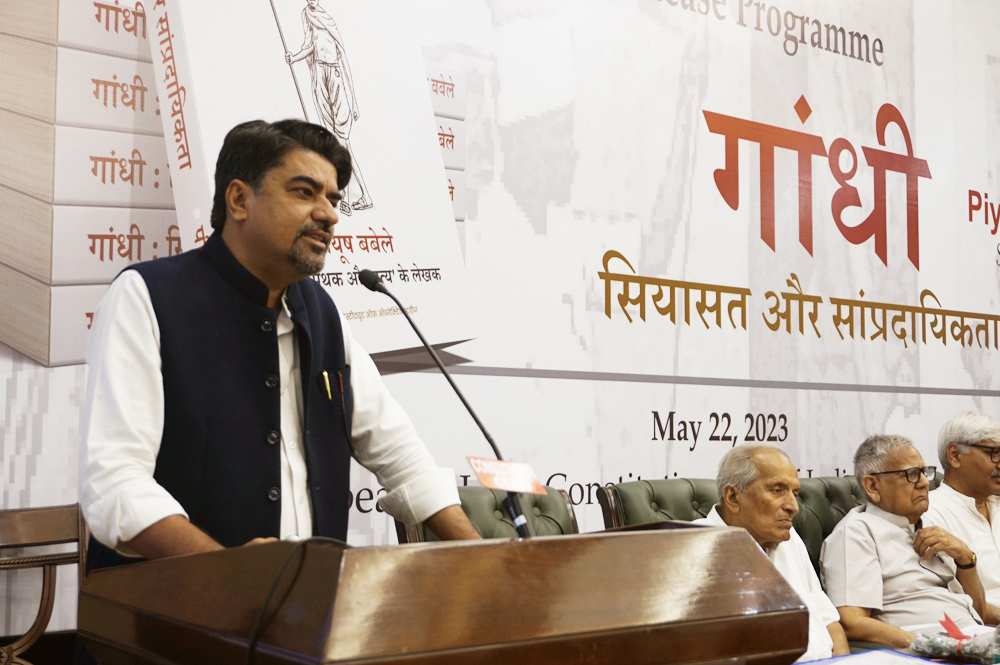
The author of the book, Piyush Babele, while introducing the contents of the book, said, "The focus of the book is on communalism, and the misinformation and the propaganda being spread through social media platforms and WhatsApp, for example, like Gandhiji did Muslim appeasement and he was rather an anti-Hindu leader.
These days, many people make allegations that Gandhi justified the Moplah (Muslim) riots of 1921 and did not oppose it. "In the book, I have also tried to explain the myth entrenched in the mindset of the people regarding the role of Gandhi during the partition of India. This book also highlights the challenges India is facing today and the way forward from here," said Mr. Piyush.
After the release of the book, Tushar Gandhi, while lauding the author's efforts, said, "The book is very timely and vital because politics and communalism are what we are facing in the current context.
“Today India is not what Nehru, Gandhi, Patel and Maulana Azad had dreamt of. Today politics of hate is dominating us, and that is why this book is significant as it reminds us of our heritage and history. The primary purpose of history is to learn lessons from the past and not to repeat mistakes, if any, in future. We are repeating the same mistake of hatred in the past and are caught in the web of hate in the current time”.
“On the way forward, the great-grandson of Mahatma Gandhi said, "In Independent India, we are used to blame the British for everything and try to justify our wrongdoing under the guise of partition. Our country's development pace after 75 years of Independence is much slower than the countries devastated during the two world wars, and today, they are developed nations,” he observed.
“If we keep repeating the wrongs of the past 75 years and thrive on politics of hatred, then we will never become a responsible nation, thus hardly moving towards progress and development."
"On the backdrop of communalism, caste politics killed Mahatma Gandhi because Gandhi was seen as an obstacle against the politics of hatred and, above all, against the proliferation of caste politics and casteism. The upper caste people have been trying to kill Gandhi from 1934 onwards. Eventually, Gandhi was killed in 1948 while taking advantage of the situation then and pretending to be desh bhakt (patriot). And since then, the narrative is that the desh bhakt killed Gandhi, who was anti-nation and anti-religion," added Tushar Gandhi.
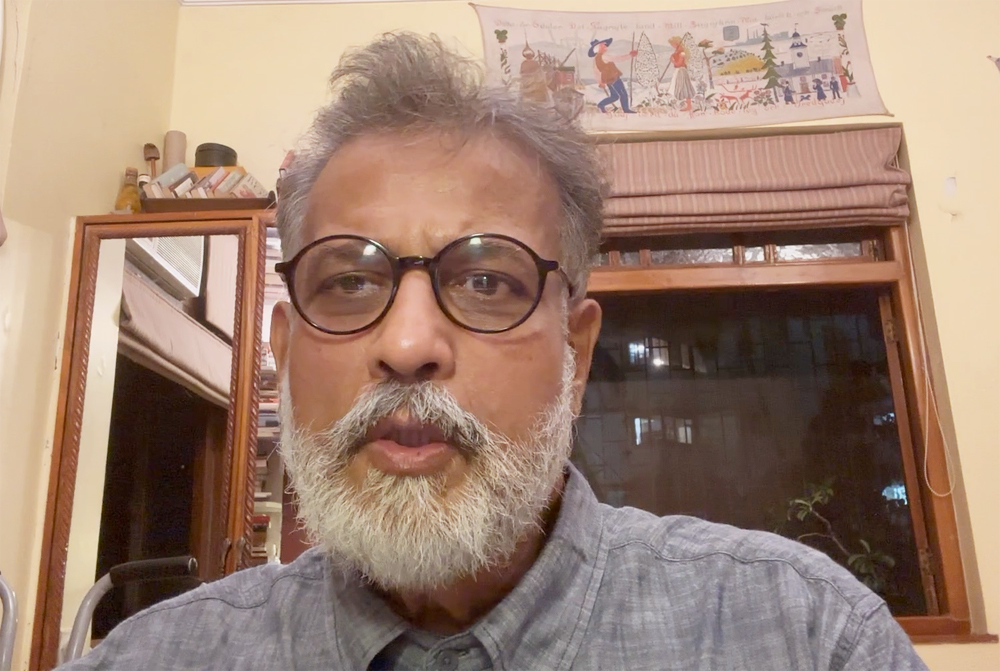
Tushar Gandhi observed that caste politics had much to do with the present state of affairs. This politics was still halting the pace of progress. Gandhiji called himself a Sanatani Hindu without being a casteist. He called for constant vigil on the part true patriots to never let the dream of Gandhiji die. This was necessary to preserve Gandhian legacy that lived in the heart of crores of Indians, he added.
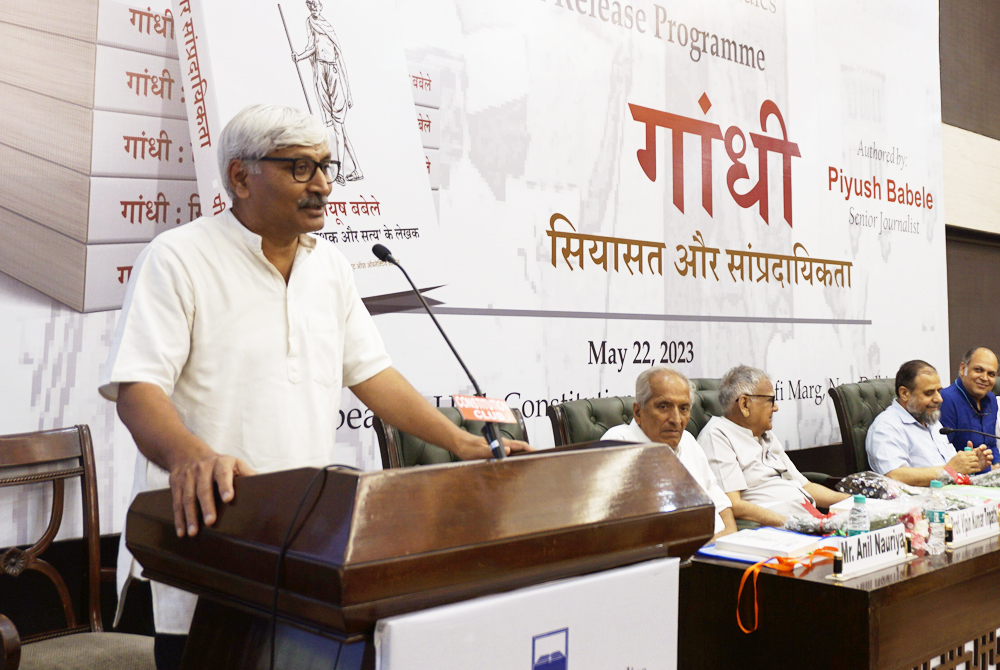
Professor Apoorvanand, a well-known writer, academician, and professor of Hindi at Delhi University, praised the author's scholarly work and said, "This book speaks about what Gandhi said and dealt with during the crisis from South Africa and till his last breath. It narrates his struggle from one situation to another, depicting him as a struggling man.
The nature of communalism that was witnessed in pre-Independence India could not be said to be the same after Independence because today it was majoritarianism which was the real threat. The challenges the people faced today were a big concern for non-Muslims and Muslims. Is the majority under threat or the minority, he quipped.
He observed that the real challenge was not communalism today. Instead, majoritarianism became a monstrous challenge in the current context."
Describing the book as timely, he said that one could listen to Gandhiji in it. The book had references to crises and the struggle of his life. One could see his life as a saint and a politician.
During this period he seemed defining a politician and politics. Gandhiji explained that a politician worked on strategy. But he preferred morality in policy planning. He maintained that in the pre-Independence period, there was competitive communalism. That was the reason why Gandhiji was fighting against both Hindu and Muslim communalism. But the thing had now changed with majoritarianism replacing communalism. He voiced concern over the rising trend of attacks on Muslims and Christians. He said that he was dubbed as pro-Muslim, but that was not true. In fact, he was against majoritarianism. He maintained that contentious issues could be resolved only in the Constitutional framework.
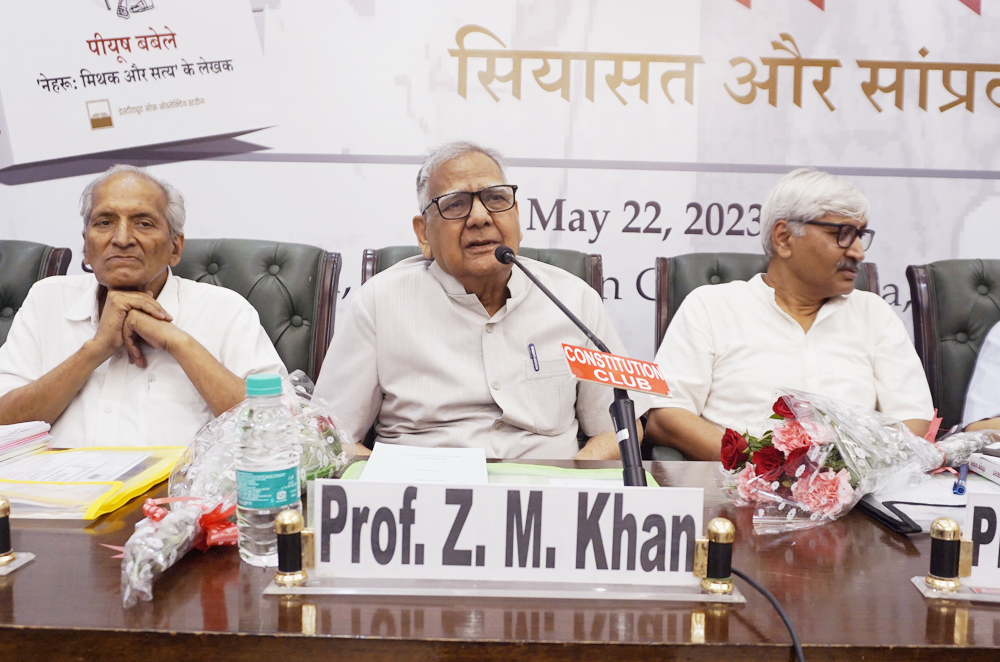
In his welcome address, the secretary general of the IOS, Prof. Z.M. Khan said that the country was currently passing through a very critical phase. Thus the need of the hour was to wait and exercise patience. He advised the community to do something tangible so that the new generation could take inspiration in this hour of trial. Referring to the activities of the institute, he said that it had been organising symposia, seminars and conferences at national and international level. Besides, scholarships were being distributed among needy but meritorious students pursuing various courses in universities. Seminars on burning social and economic issues were regularly organised. The institute also conducted surveys on the current status of deprived sections and minorities. Research projects on various topics were approved to researchers after they submitted their proposals. The institute also brought out regular publications, like magazines and books in Urdu, English, Hindi, etc. Two awards-Shah Waliullah award and Life Time Achievement award had been instituted to honour scholars and public figure who made significant contribution in their fields. He urged the community leaders to unitedly raise their voice on the problems faced by them. He invited all the scholars as well as students on behalf of the institute to share their ideas and reactions. He concluded that India was facing a grave crisis.
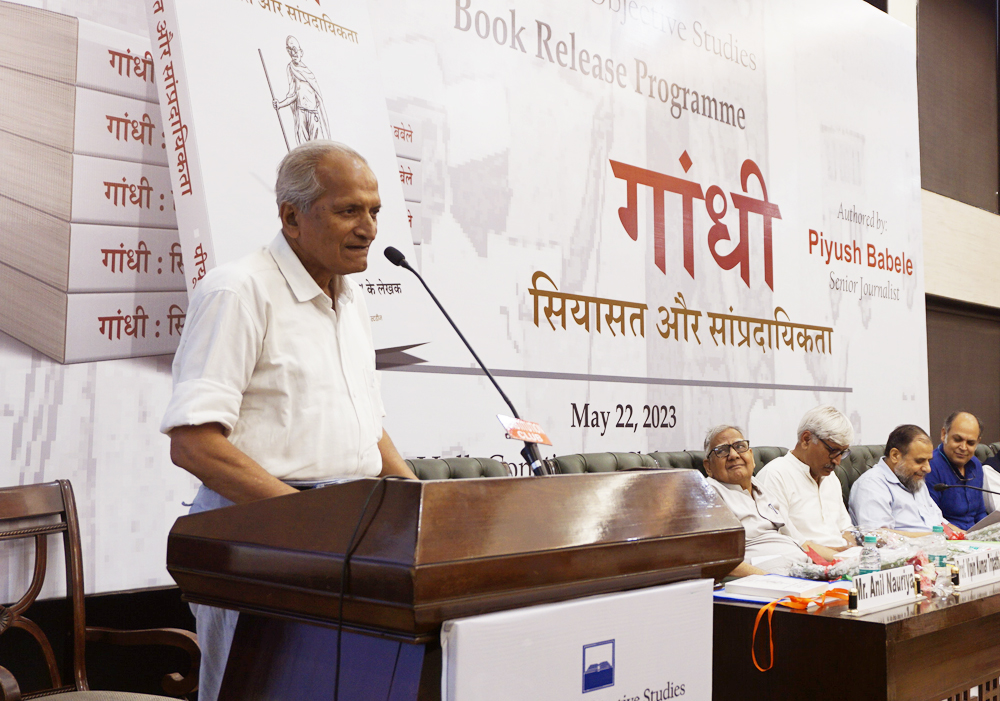
Ex-professor of IIT, Delhi and a well-known social activist, Prof. Vipin Kumar Tripathi, expressed happiness that Babele came out with a fine book. He articulated his views on communalism in the book. He said that the shop of communalism was not run by the RSS; it was the trading community (Baniya) which was running the show. After the liberalisation, the entire trading community went with the BJP. It was Gandhiji who took every community along in his struggle against the British raj. Both Hindus and Muslims fought the battle against the Britishers in unison. Every section of society helped each other in the fight against foreign rulers. Laying blame on aristocracy for partition, he said that their role had been reprehensible.
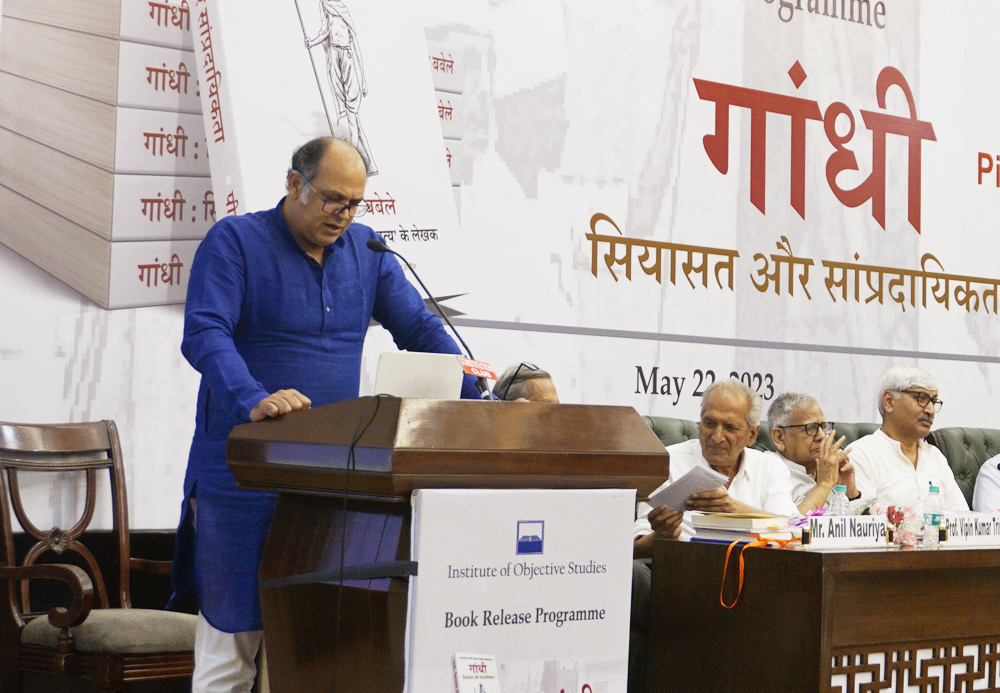
Founder of Mahatma Gandhi Award, New Delhi, Amit Sachdeva quoted a couplet of the famous Urdu poet, Qateel Shifai and said that Gandhiji laid down his life fighting against communalism. Those who killed Gandhiji, were watering the plant of communalism. These were the same elements who sowed the seeds of division between Hindus and Muslims. On one hand were true Hindus who practiced their religion in true sense of the term and had respect for other religions. But on the other hand were Hindutvavadis who had scanty regard for other religions. Difference between Hinduism and Hindutva was similar to the one that existed between Gandhiji and Savarkar. Gandhi wanted that followers of all religions should practice their faith while giving respect to the followers of other religions. He noted that today Gandhiji was being targeted by spreading wrong message among the youth. He said that the need of the hour was to not believe in hearsay but turn to Gandhiji for their answers. Gandhiji was not an individual but also an idea. The present book had been written with fortitude and more such books should be written to checkmate falsehood and propaganda, he added.
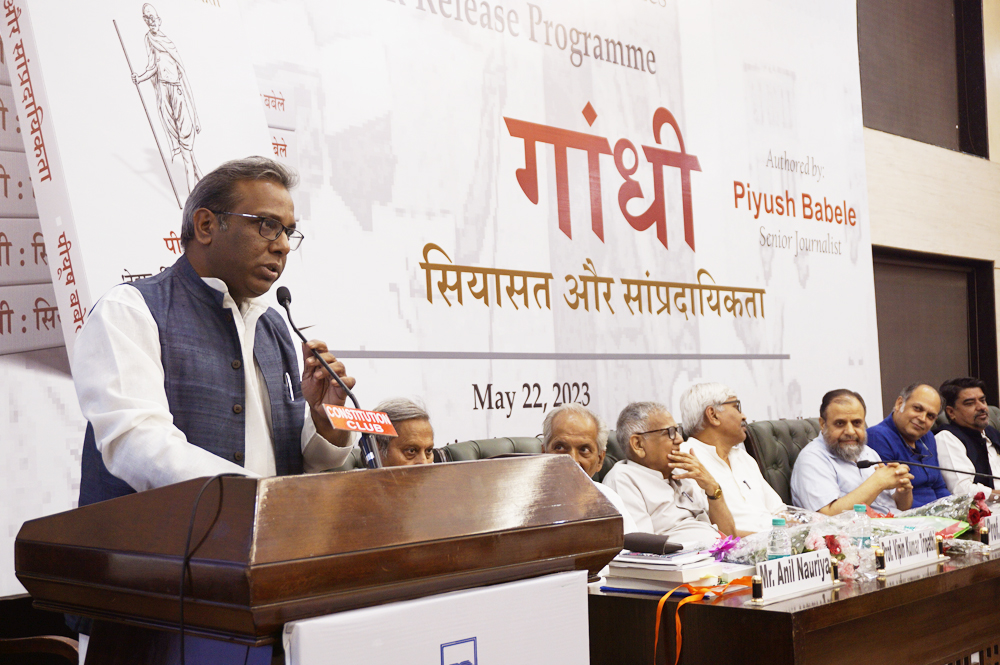
Historian, author and freelance researcher, Dr. Ashok Kumar Pandey held that not much work had been done on history in Hindi. This also resulted in the Hindi hinterland turning into a laboratory of hatred. That was the reason why sometimes those working against communalism were also led astray. The book under discussion was like a guide which laid bare facts about Gandhiji. He urged the people to purchase and read the book. People in general did not read books and formed their opinion on the basis of WhatsApp. But, in order to know the truth, they should read books. Unlike Savarkar, who propounded political Hindutva, Gandhi was a religious and never shunned religion. Savarkar was almost an atheist and worked like an arm of the Britishers. On the other hand were leaders like Gandhiji, Jawaharlal Nehru, Sardar Patel and Maulana Azad who stood for Hindu-Muslim unity. With a view to keeping the unity of the country intact, a war should be waged against communalism and majoritarianism. This was possible only when the message percolated down to the level of common people.
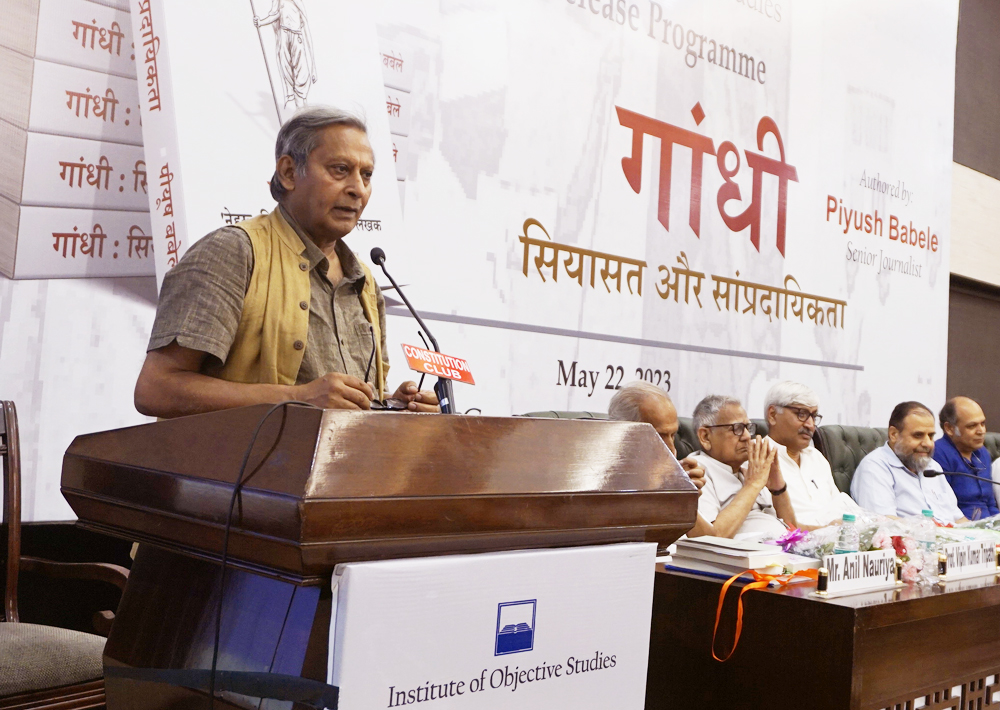
Lawyer and writer, Anil Nauriya called for working among those who were affected by communal incidents. Brick-bats were exchanged at communally sensitive places. South Africa acted as a laboratory for Gandhiji who fought for the rights of African people. Commenting on Moplah riots, he said that falsehood was deliberately spread to defame Gandhiji. Babele also narrated this episode in his book. In this connection, he mentioned the Dharam Sansad organised in Haridwar in 2021 where Gandhiji was accused of justifying Moplah riots. But the fact of the matter was that Gandhiji never justified the riots. Similarly, Muslim leaders also condemned Moplah riots. He also stated that Gandhiji never withdrew civil disobedience movement after Chauri-Chaura incident. He observed that Gandhiji was opposed not only to political imperialism, but also the economic imperialism. Expressing concern over attempts to destroy popular symbols of unity and struggle, he called for preserving them. He made special reference to the renaming of a hospital in Haryana after the ex-Prime Minister Atal Bihari Vajpayee altering its name after Badshah Khan.
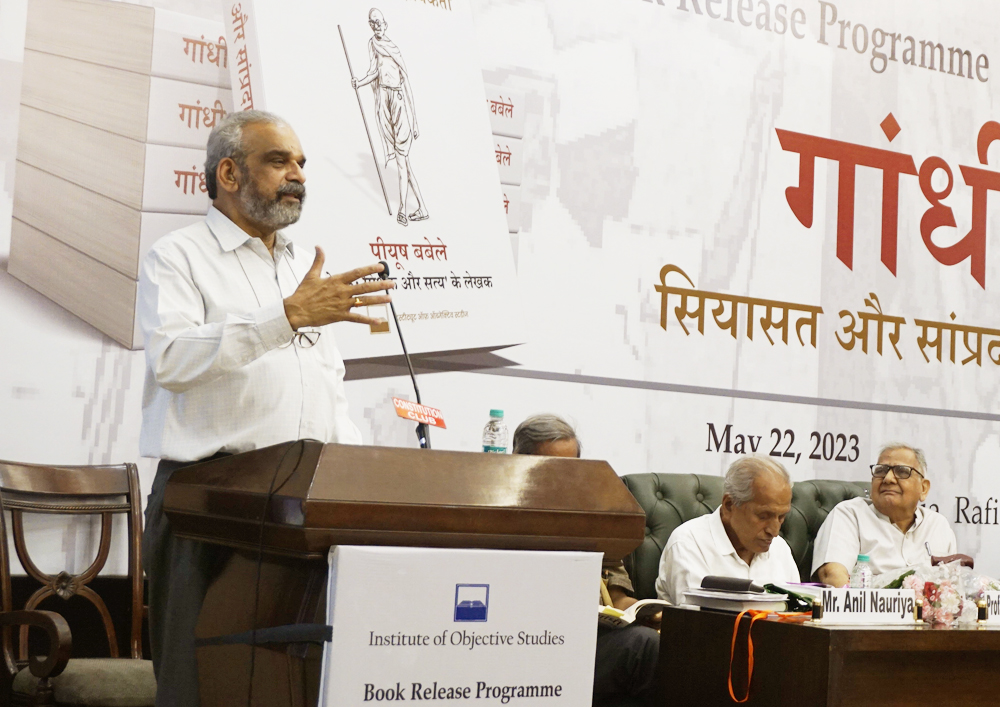
Ex-editor of the English daily, the Tribune, Delhi, Shastri Ramachandran, drew a parallel between the results of the recently held Karnataka assembly elections and the Khilafat movement. He said that the Khilafat movement was completing hundred years and as such Karnataka assembly elections assumed importance. Defining secularism, he said that it was against preference to a particular religion. Secularism treated all religions at par. In fact, state had no religion of its own. Khilafat movement was important because both Hindus and Muslims extended their support to it. Gandhiji played a pivotal role in mobilising public support in favour of Khilafat movement. Unprecedented unity between Hindus and Muslims was witnessed during the Khilafat movement. Gandhiji had appealed to Hindus to participate in the Khilafat movement and opposed the boycott of Turkey. He had termed the non-cooperation movement as a religious duty. He held that Godse was being idolized today by those who played no role in the freedom struggle. Referring to Karnataka, he said that Gandhiji had predicted in 1924 that it would show the way one day. The results of Karnataka assembly proved beyond doubt that the state handed down a rich legacy. Equality and democracy were now restored in Karnataka, he remarked.
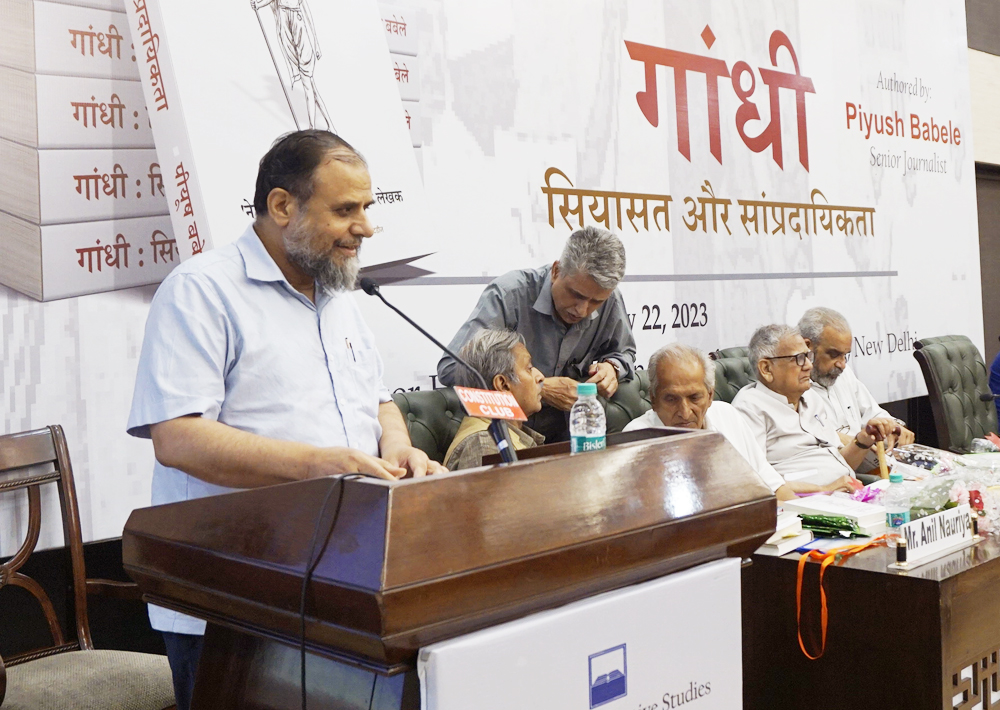
Presiding over the function, Vice-Chairman of the IOS and the Pro-Vice-Chancellor, IILM University, Greater Noida, Prof. M. Afzal Wani, observed that Gandhiji was not only an individual but also a thought. Whatever Babele wrote, was objective. IOS too was an objective institution. Laying emphasis on the analysis of facts, he said that intent was more important than the action. Gandhiji belonged to everybody because his message of love, peace and non-violence was beneficial for the entire humanity. He was an apostle of truth which he never discarded. It was due to his truthfulness that the Chinese people preferred Gandhiji over their hero, Mao Zedong. He opined that Indians should not always be swayed by prevailing ideas. Gandhiji took every section of society along. He talked of women, youth, labourers, peasants, etc.; and hit out at social evils. He was a spiritual soul who always preached truth, peace and non-violence, Prof. Wani concluded.
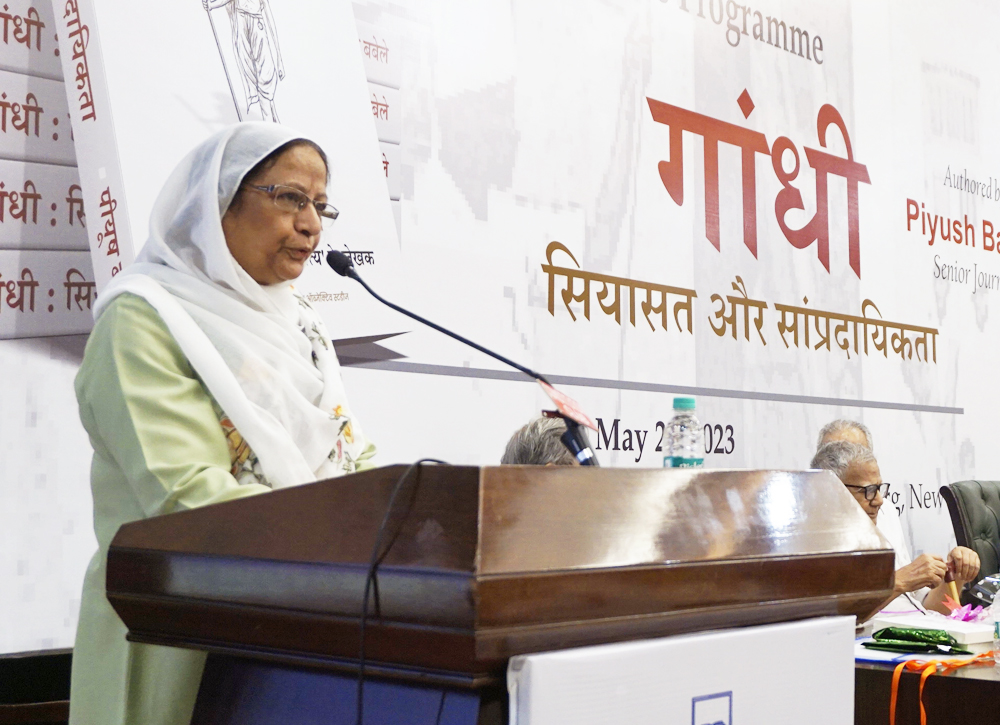
While senior journalist, Raju Mansukhani, conducted the proceedings, Assistant Secretary General, IOS, Prof. Haseena Hashia extended a vote of thanks to the attendees. Prominent among those who were present at the function included Padma Shri Prof. Akhtarul Wasey, Ex-Vice-Vhancellor, Magadh University, Bodh Gaya, Prof. M. Ishtiyaq, Dean, Faculty of Social Sciences, JMI, Prof. Ishaque Ahmad, Maulana Abdul Hameed Nomani, several journalists and prominent citizens.
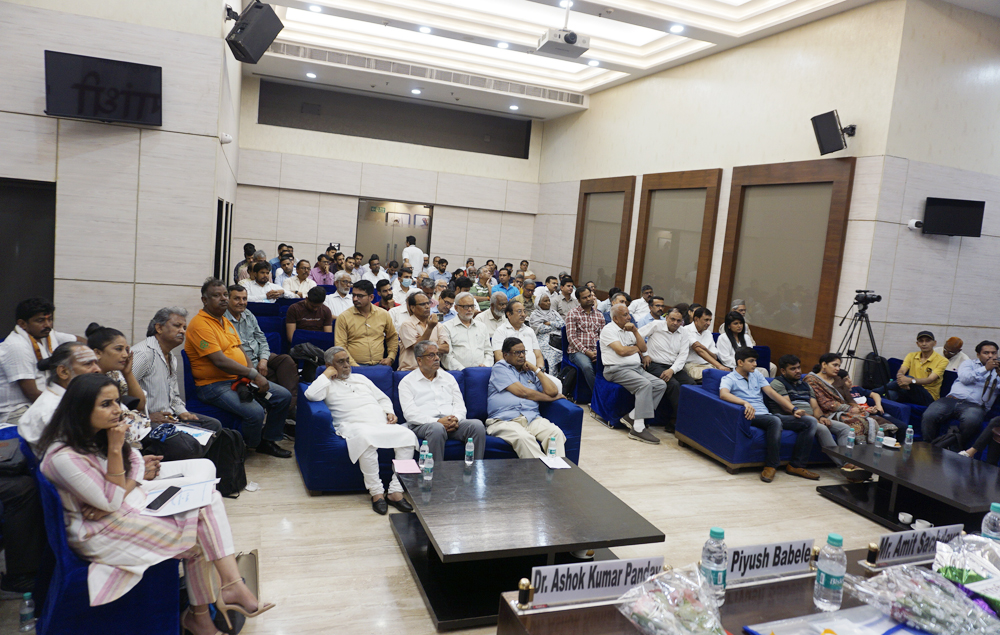
A view of audience
More Coverage:
A Short Report in English
Report in Hindi
Link of Lallantop
https://muslimmirror.com/eng/india-cant-become-a-responsible-nation-until-it-thrives-on-politics-of-hate-tushar-gandhi/
https://currentaffairs.adda247.com/a-new-book-titled-gandhi-siyasat-aur-sampradaiykta-written-by-piyush-babele/
https://exampur.com/current-affairs/english/a-new-book-gandhi-siasat-aur-sampradaya-written-by-piyush-babele/
https://www.mpnn.in/book-innougration/
https://sarkaripariksha.com/current-affairs/a-new-book-titled-gandhi-siyasat-aur-sampradaiykta-written-by-piyush-babele-released/
https://www.siasat.com/india-cant-become-a-responsible-nation-until-it-shuns-politics-of-hate-tushar-gandhi-2596931/
https://theindianawaaz.com/india-will-remain-strong-and-peaceful-only-when-gandhis-ideology-is-followed-tushar-gandhi/
National Express Bureau
Go Back